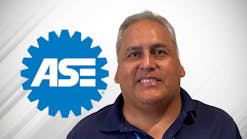Year One is in the books, folks.
When you ask rookie automotive educator Henry Valenzuela what his first year teaching at McNeil High School in Austin, Texas, was like, he gets somber, and treats it as something sacred—a promise long made now fulfilled, “My instructors back in college had recommended that I needed to teach at least part-time when I graduated,” he said.
He’s harkening back to his St. Philip’s College days in 1993, when his instructor planted a seed, telling the young automotive technology graduate that it would be right for him to one day return to teach and serve the community that had taught him.
For thirty years, that advice remained in the back of Valenzuela's mind as he built an impressive automotive career. His path took him through GM dealerships—Chevrolet, Buick, and Cadillac—before expanding into heavy equipment and over-the-road trucks. After a stint with an ambulance company, he spent eleven years with the City of Austin, working on everything from police cars to dump trucks. His last four years were at Austin Bergstrom International Airport, maintaining ground power units and the entire fleet of airport vehicles.
Valenzuela has maintained his ASE Master Certified status throughout most of his career, a testament to his expertise. Today, he’s an automotive educator applying for a dual-credit adjunct position with a community college to go ahead of and expand opportunities for his high school students.
After three decades, Valenzuela has answered his instructor's call to give back—he’s bringing real-world experience and master-level expertise to young technicians hoping to walk a mile in his steel-toe shop boots.
Q. What was the transition from shop to classroom like for you this first year? How did you get your opportunity?
Henry Valenzuela: Because I did get an associate's degree from St. Philips College way back in the day, I applied to my school district, and they started me on an emergency certificate because it's a high-need area, and now I'm working on my teaching certificate.
I learned this year that it's very tough for somebody if you don't have a support system. I have a veteran teacher who has been helping me. It’s extremely easy when you have to work with a person who’s willing to open his book to show you everything that he's doing. He's making me a better person. He's doing this for the same reason that I want to do it—for the students. It's been a great year. What’s tough is the challenges of the attitudes and the personalities. They respect you when you find that balance between demanding respect and giving them respect at the same time. It does help.
Q. As a teacher, what do you feel that you were equipped to do well, and what do you feel like you had to learn on the way?
Valenzuela: So, part of the things the first year the students told me was that it was fun to be in my class. Nobody wants to just talk about how the car rolls. There's no excitement or joking or nothing challenging. It’s just kind of a stick in the mud. We want to spice it up a little bit, make things interesting.
What I wasn’t prepared for was 40 different icons on my computer to get to 30 different screens to do 12 different things. That and the school district has budgetary constraints. So they change things from one program to another from one year to the next. And you have all these different things you've got to report to, sometimes two to three times on those different apps.
There have been a lot of positives that I learned, but having a good support system from the veteran teacher was the most important for me.
Q. How are you getting in there with the students to equip them and prepare them for their future?
Valenzuela: I'm teaching with another first-year teacher next door. We teach the same class, and we might be working on steering at the same time. He's going to work on one aspect of the steering, and I'm going to work on another. We might trade off and do suspension and steering. We work well together. We have a great facility so that we can do that. And we have vehicles that have been donated by the community college and by manufacturers. Just working well together and not overshadowing each other with who's first or who's not, but making sure that we take care of cross-training if we have to. Sometimes a veteran teacher will come in and help us, too. So, it's been very good and very interesting.
Q. How are you working with students and their parents, and helping their parents understand the value of being in automotive?
Valenzuela: It can be challenging for certain students. We have students on a wide spectrum with their financial means. And sometimes it's difficult to get a hold of a parent because they're working two jobs or more. Sometimes it's difficult to get hold of the ones who are well off because they're busy or one parent is the only one that talks to you, and basically you do the best that you can.
The main form of communication is by email and sometimes by phone, but it’s basically reassuring them that my main concern is to let them know that I have all 10 of my fingers and all 10 of my toes and I'm going to do the same for their kids and I'm going to teach them something that even if they do not decide to go into this field, they're going to learn how to change a tire, They're going to learn something about safety and learn one thing such as changing a battery or jumpstarting a vehicle safely for in the future.
Q. What's been rewarding for you as a first-year instructor?
Valenzuela: Some of the feedback from the students. At the end of the year, they say, “I appreciate everything you taught us,” and “You made the class interesting.” And that's some of the feedback that I get from some of those students with disciplinary issues. They need that tenderness, sometimes, to understand that I'm here for their learning and I'm going to do what I need to. So that's some of the most rewarding things.
The other thing that was most rewarding was our SkillsUSA competition that the veteran instructor had already had in place. I traveled with them to see how it's changed since I was in high school. I think we took 12 students to the state competition in Corpus (Christi) this year for SkillsUSA, and they came back with 17 medals for taking a technical test. So, I'm very proud to see that we were a part of that. We try to help each other out whenever we can. Like I said, we're enjoying seeing them succeed, and then it builds confidence in them.
Q. Has a relationship with ASE been beneficial to your program?
Valenzuela: Definitely. One of the things that we teach is that our program, our facility, and our school are (accredited) through ASE.
Q. Do you see yourself embracing teaching long-term?
Valenzuela: I believe so. I mean, it's taken me a long time to get here, and I really have enjoyed it. I think the more that I do it, it's going to be a little bit more of a comfort. I mean, I feel comfortable doing it now, so I hope that it can get smoother. There's always going to be a change. And we want to make sure we get this end result: a student who is valuable to the community and to our workforce.

